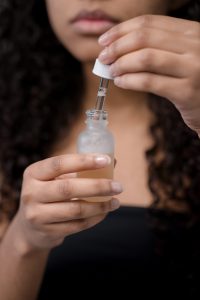Skincare Ingredients and Treatments That Really Work

Hyperpigmentation is a common skin concern that affects many people, especially those with darker skin tones. It occurs when your skin produces excess melanin, which can result in dark spots, patches, or uneven skin tone. Fortunately, there are several skincare ingredients and treatments that can help fade hyperpigmentation and give you a more even complexion. In this blog, we’ll explore some of the top ingredients and treatments that really work.
Vitamin C
Vitamin C is a powerful antioxidant that can help brighten and even out your skin tone. It works by inhibiting the production of melanin, which can help reduce hyperpigmentation. Look for serums or creams that contain a high concentration of vitamin C (at least 10%), and apply it to your skin in the morning after cleansing and toning. Be sure to wear sunscreen during the day, as vitamin C can make your skin more sensitive to the sun.
Hydroquinone
Hydroquinone is a topical medication that can help fade hyperpigmentation by blocking the production of melanin. It’s available in over-the-counter creams, but you may need a prescription-strength formula for more severe cases of hyperpigmentation. Apply the cream to the affected areas of your skin once or twice a day, and be sure to follow your doctor’s instructions carefully.
Retinoids
Retinoids are derivatives of vitamin A that can help promote cell turnover and exfoliate your skin, which can help fade hyperpigmentation. They also stimulate collagen production, which can help reduce the appearance of fine lines and wrinkles. Look for products that contain retinol or prescription-strength retinoids like tretinoin, and apply them to your skin at night after cleansing and toning. Be sure to wear sunscreen during the day, as retinoids can make your skin more sensitive to the sun.

Kojic Acid
Kojic acid is a natural ingredient that can help inhibit the production of melanin, which can help reduce hyperpigmentation. It’s available in over-the-counter creams and serums, and it’s often combined with other ingredients like vitamin C or hydroquinone for added effectiveness. Apply the product to your skin once or twice a day, and be sure to wear sunscreen during the day.
Chemical Peels
Chemical peels are professional treatments that can help exfoliate your skin and fade hyperpigmentation. They work by applying a solution to your skin that removes the top layer of dead skin cells and stimulates cell turnover. There are several types of chemical peels available, including alpha-hydroxy acids (AHAs), beta-hydroxy acids (BHAs), and trichloroacetic acid (TCA) peels. Your dermatologist can recommend the best type of chemical peel for your skin type and concerns.
Laser Treatments
Laser treatments are another professional option for fading hyperpigmentation. They work by targeting the excess melanin in your skin and breaking it up into smaller particles, which your body can then naturally eliminate. There are several types of laser treatments available, including intense pulsed light (IPL) therapy and fractional laser resurfacing. Your dermatologist can recommend the best type of laser treatment for your skin type and concerns.
In conclusion, there are several effective ingredients and treatments that can help fade hyperpigmentation and give you a more even complexion. Vitamin C, hydroquinone, retinoids, kojic acid, chemical peels, and laser treatments are all effective options, but it’s important to work with a dermatologist to find the best treatment plan for your skin type and concerns. Remember to wear sunscreen during the day, as sun exposure can exacerbate hyperpigmentation. With patience and consistency, you can achieve a more even skin tone and fade hyperpigmentation.
However, it’s important to note that hyperpigmentation can be a stubborn condition, and it may take several weeks or even months to see noticeable results. It’s also important to take a holistic approach to your skincare routine and make sure you’re taking care of your skin from the inside out. This includes eating a healthy diet, getting enough sleep, and avoiding habits like smoking or excessive alcohol consumption that can damage your skin.

In addition to the ingredients and treatments mentioned above, there are also several other steps you can take to help fade hyperpigmentation. These include using a gentle cleanser to avoid irritating your skin, incorporating a gentle exfoliating product into your routine to remove dead skin cells and promote cell turnover, and using a moisturizer to help keep your skin hydrated and healthy.
When it comes to choosing skincare products for hyperpigmentation, it’s important to look for products that are specifically formulated to address this concern. This means choosing products that contain the ingredients mentioned above, as well as other ingredients like niacinamide, arbutin, and licorice root extract, which can also help brighten and even out your skin tone.
Ultimately, the key to fading hyperpigmentation is to be patient and consistent with your skincare routine. It may take some trial and error to find the right combination of products and treatments for your skin type and concerns, but with the help of a dermatologist and some dedication, you can achieve a more even and radiant complexion.

